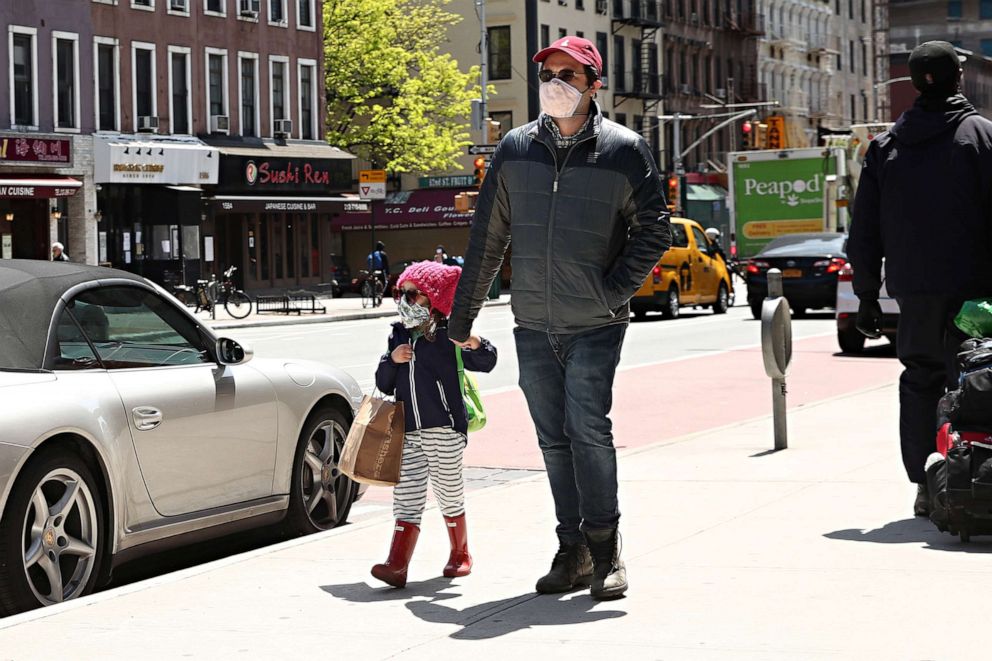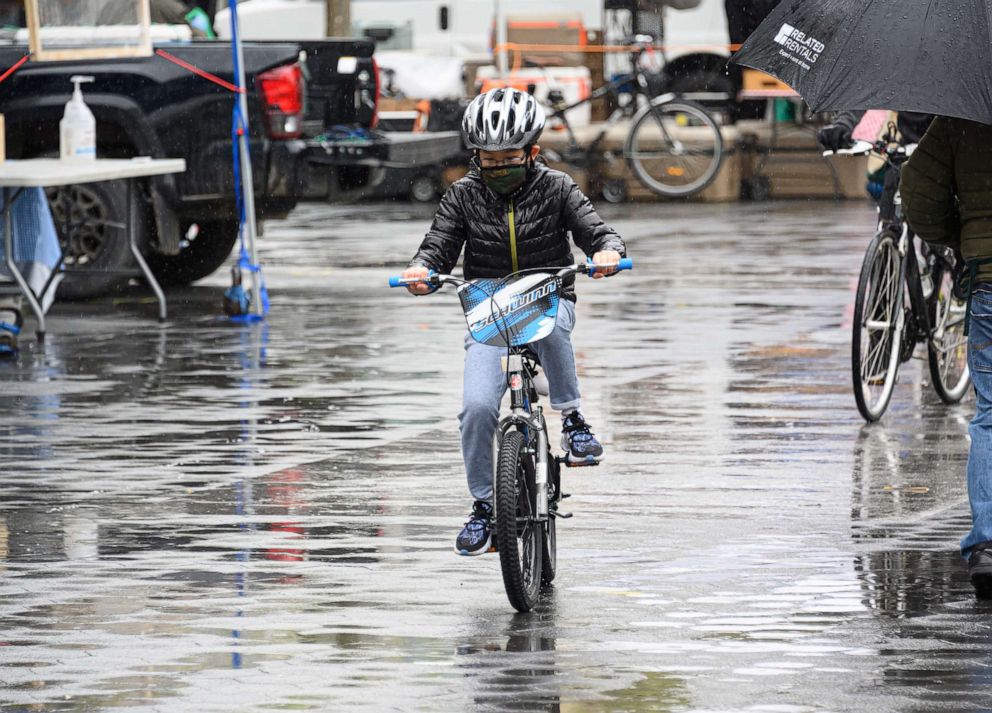With over 200 possible cases, doctors warn reports of rare, coronavirus-linked child inflammatory illness likely to rise
Over half of reported cases are in New York, but at least 20 states see cases.
Medical professionals in 20 states and Washington D.C. are investigating more than 200 confirmed or suspected cases of a mysterious illness thought to be linked to the coronavirus and affecting children, according to a new ABC News survey of hospital and state health officials across the country. And while the unexplained syndrome is believed to be extremely rare, experts said they expect the number to grow.
Experts said the inflammatory syndrome, recently named by the Centers for Disease Control and Prevention as Multisystem Inflammatory Syndrome in Children (MIS-C), resembles toxic shock syndrome and Kawasaki disease, itself a rare inflammatory disease typically affecting children under the age of five, and has the potential to be deadly. At least three children have died with the syndrome in New York, where at least an additional 119 cases are under investigation, according to the New York State Department of Health.
While the CDC says the group of symptoms is "associated with" COVID-19, exact cause remains a mystery.
Many kids, though not all, who experience symptoms of MIS-C -- which include fever, rash, eye irritation, swollen lymph nodes and/or swelling of the hands and feet -- either have been diagnosed with COVID-19 or tested positive for the antibodies, said health experts. And doctors say even those that have tested negative for antibodies could test positive later because of the lag in antibody development.
According to the CDC, It typically takes one to three weeks after someone becomes infected with the novel coronavirus for their body to make antibodies, and some people could take longer than that.
The illness is only a small percentage of the 1.5 million coronavirus cases in the U.S. Dr. Courtney Gidengil, a pediatric infectious disease physician and a policy researcher at the thinktank RAND, said the syndrome is incredibly rare, and parent’s should not panic.
But Gidengil warned the U.S. should expect to see the number of reported cases of the mystery illness rise.
“It seems like it takes four to six weeks for [MIS-C] to develop after infection, not due to the virus itself but rather the body’s response to the illness,” Gidengil said. "We probably will start to see it pop up more around the entire country.”
There is no current official tally of suspected incidents of the illness nationwide, but an ABC News survey of hospital and state health officials in all 50 states and Washington, D.C. found at least 220 confirmed or possible cases of the illness. The majority of possible cases have been reported in New York, but more than a dozen have also been reported in New Jersey and Michigan, and officials said they also saw potential cases in Massachusetts, Washington D.C., Connecticut, California, Utah, Delaware, Illinois, Kentucky, Louisiana, Ohio, Oregon, Pennsylvania, Washington State, Tennessee, Mississippi, Missouri, Georgia and Minnesota.
Some other states like Maryland and North Carolina have told ABC News they don’t have any confirmed cases but are monitoring for any suspected cases.
"I'll wager that's going to only go up and it's going to be much more widespread than anyone thinks," New York's Cuomo said.

The CDC sent a warning Thursday to thousands of doctors to be on the lookout for the illness, which was previously known as pediatric multi-system inflammatory syndrome, or PMIS. Friday the government agency said that surveillance of the disease "is limited," but "now that the case definition and [a health alert] are out, more info is likely to follow."
Health departments across the country said they have already been on the lookout. Doctors in the U.K., Italy and Spain reported an increase in cases there last month.
The Michigan health department sent out an alert earlier this month to local health agencies and health care providers about the disease and a reminder to report suspected cases within 24 hours. To date, there are 17 suspected cases under review in the state, Michigan health department spokesperson Lynn Sutfin told ABC News. New Jersey, which has reported a total of 18 cases as of Wednesday, sent out their own alert earlier this month as well.
A doctor in Oregon told ABC News proper knowledge about the illness allowed an afflicted eighth grader to get treatment immediately, which ultimately helped save her.
"I'm very grateful because I could have been gone," 14-year old Leah said in an interview with ABC . "I'm glad I got help right away."
In California, the state has yet to declare the syndrome a reportable illness, but hospitals have been paying close attention as early as March. Dr. Jim Stein, chief medical officer at Children’s Hospital Los Angeles, said the illness is a sign that the impact of the novel coronavirus is extending to children in a way that “this is no longer considered necessarily less significant for children than it is for adults.”
The CDC alert said that “It is currently unknown if multisystem inflammatory syndrome is specific to children or if it also occurs in adults.”
But little is known about the illness' connection to COVID-19.
Of the 16 children with inflammatory symptoms in California, 14 have been tested for coronavirus antibodies, Stein said. None of them had tested positive for the coronavirus detection at the time they were admitted to the hospital, but four of them tested positive later. Stein added that the 10 patients that tested negative could also develop antibodies later.
Dr. Andrew Pavia, a doctor with the University of Utah who has been monitoring two suspected cases at the Intermountain Primary Children’s Hospital, said treatments given to patients with the toxic shock related symptoms could also interfere with antibody tests for COVID-19, further complicating the efforts to identify any link between the two.
Health experts are also going back to their current and past patients as they examine more patients and the case definition of the illness broadens from the classic Kawasaki disease, which could increase the number of cases brought forth.
“There's just a lot to worry about with respect to kids,” Alker said. “We really need a national strategy we need our leaders to sort of thoughtfully consider and address this wide range of threats that children face right now to their health and development.”
“And unfortunately there's just no sign that exists right now,” Alker added.
With new illness, questions about summer camps, schools re-opening
The sudden rise in critically ill children, albeit extremely small nationwide, has only further ignited the debate surrounding reopening, especially when it comes to schools.
Most states have decided that school openings will occur on a local level, and for nearly the entire country that decision still hangs in the balance. But the start of summer camps and summer programs is just around the corner, and many states have already moved to allow them to go on. States including Georgia, Tennessee, and Connecticut all have possible cases of MIS-C they have been monitoring in their state but have said summer camps may reopen with various forms of social distancing in place.
Dr. Anthony Fauci, the nation’s top infectious disease expert, repeatedly warned lawmakers during a hearing on Tuesday about opening schools and businesses too soon, which he said could cause further outbreaks.
“We don't know everything about this virus and we really better be very careful particularly when it comes to children," Dr. Fauci warned.
But some lawmakers have been quick to dismiss the warnings, eagerly pushing to open schools in the fall, which are seen as a major indicator of the country being officially opened.
Sen. Rand Paul, R- Kentucky, pushed back on Fauci's calls for cautiousness and said it would be a “huge mistake” not to let kids return to school sooner. President Trump also told reporters Wednesday that he was “surprised” by Fauci’s comments. He said it was “not an acceptable answer.”
"I think that we have to open our schools," Trump said in an interview on Wednesday. "Young people are very little affected by this. We have to get the schools open."

In Connecticut, where Gov. Ned Lamont and hospitals have recently confirmed that at least five children in the state are being monitored and treated for the new syndrome, the state’s Office of Early Childhood announced this week that summer camps, with the exception of overnight camps, can open on June 29 with specific guidance in place, including a requirement to get a permission to host a group more than 30 as well as other social distancing measures. When schools can reopen there remains a question, as Education Commissioner Miquel Cardona said this week that the school reopening plan will depend on infection trends and that they will need to be flexible.
Georgia Gov. Kemp has implemented a similar measure. Summer camps were permitted to begin operating this week, as long as they follow 32 mandatory criteria that his team developed in absence of the CDC’s guidance. Overnight camps are prohibited. Kemp's office did not respond to a request for comment about how the new illnesses in the state would impact his decisions about schools moving forward.
In most other states, some summer camps are opening up while some other camps are choosing to remain closed amid state governments’ lack of state-wide directives.
In Maryland, Montgomery County this week went ahead and cancelled all summer camps in the county as it awaits for state health department's guidance for camps. Guidance on summer camps is pending in Michigan and Massachusetts as well, while Missouri has left it to counties and cities to decide on the fate of summer camps.
In Utah, the Girl Scouts of Utah has extended the cancellation of “in-person meetings for troops and services of units” until June 30, but YMCA of Northern Utah is moving ahead with its camps while adhering to CDC social distancing guidelines. Schools remain closed through the end of the academic year.
An 'additional risk to consider'
Early concerns about re-opening schools had more to do with the possibility of children potentially transmitting the coronavirus to their teachers, parents or elderly grandparents, who have shown to be much more susceptible to COVID-19's more serious effects.
Pavia said that the new "scary illness" affecting kids, while very rare, has only added to the difficult safety calculations.
“I think it's one more factor to put into the very complex decision making about letting kids go back to school in the fall or the summer camps,” Pavia said. “We know that overall they're likelihood of getting severe respiratory disease is very low. We think that MIS-C is a rare but very serious complication, and you know how it's hard to make decisions about rare but serious events.”
“I think for schools, it's just an additional risk to consider,” Pavis added. “I still think that for deciding whether to open schools, the bigger concern is what role children may play in prolonging the epidemic and infecting older people. That's likely to be a much larger impact in terms of numbers. Psychologically, this may have a bigger role.”
In the meantime, health experts are urgently trying to get the word out about the disease so parents can know identify and get their children medical attention as soon as possible.
“Parents: know the signs of Pediatric Multi-Symptom Inflammatory Syndrome to protect your child,” New York City blasted out in its text-message notification system on Friday.
"This is truly disturbing," Gov. Cuomo said of the illness at a press conference this week. "We raise it because it's something parents should be aware of."
ABC News' Katherine Faulders and Allie Pecorin contributed to this report. This report was updated May 18 to clarify references to Dr. Pavia and the Intermountain Primary Children's Hospital.



